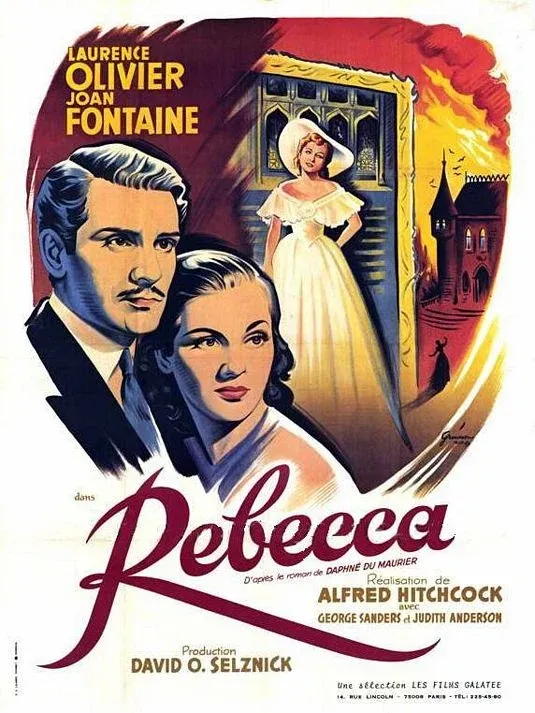
Rebecca is a 1940 American romantic psychological thriller film directed by Alfred Hitchcock. It was Hitchcock's first American project and his only film to win the Best Picture Oscar. The film stars Laurence Olivier as Maxim de Winter and Joan Fontaine as the young woman who becomes his second wife.
The screenplay was based on the 1938 novel of the same name by Daphne du Maurier. "Rebecca" received eleven nominations at the 13th Academy Awards, winning two awards for Best Picture and Best Cinematography. In 2018, it was selected for preservation in the United States National Film Registry by the Library of Congress. The film is considered one of Hitchcock's creepiest and most oppressive films and has been ranked as one of the greatest movies of all time.
Plot
The plot revolves around a young woman who becomes the second wife of Maxim de Winter, a wealthy widower. She moves to his large estate, Manderley, where she is haunted by the memories of Maxim's glamorous first wife, Rebecca, and the oppressive presence of the housekeeper, Mrs. Danvers.
As the story unfolds, the new wife uncovers dark secrets about Rebecca's life and death, leading to a climactic revelation about the truth behind Rebecca's legacy and the impact it has on her own life. The film is known for its haunting atmosphere, gothic thrills, and gripping suspense.
Watch For Free
Cast
- Laurence Olivier as Maxim de Winter
- Joan Fontaine as the second Mrs. de Winter
- George Sanders as Jack Favell
- Judith Anderson as Mrs. Danvers
- Nigel Bruce as Major Giles Lacy
- Reginald Denny as Frank Crawley
- C. Aubrey Smith as Colonel Julyan
- Gladys Cooper as Beatrice Lacy
- Florence Bates as Mrs. Edythe Van Hopper
- Leo G. Carroll as Dr. Baker
- Leonard Carey as Ben
- Lumsden Hare as Tabbs
- Edward Fielding as Frith
- Philip Winter as Robert
- Forrester Harvey as Chalcroft
- Melville Cooper as Coroner
- Billy Bevan as Boatman
- Alfred Hitchcock as Man Outside Phone Booth (uncredited)
Director: Alfred Hitchcock
Writer: Daphne Du Maurier, Philip MacDonald, Michael Hogan, Robert E. Sherwood, Joan Harrison, Barbara Keon
Box Office Gross: $111,055
Distributor: United Artists
Release Date (Theaters): Apr 12, 1940
Release Date (DVD): Oct 14, 2008
Themes & Reception
Rebecca explores themes of love, jealousy, obsession, and identity. The film is a psychological thriller that delves into the dark secrets of the past and the impact they have on the present. It also touches on the themes of class and power, particularly through the character of Mrs. Danvers.
The film was well-received by critics and audiences alike, and it won two Academy Awards for Best Picture and Best Cinematography. It is considered one of Alfred Hitchcock's greatest films and a classic of the psychological thriller genre. The film's haunting atmosphere, gothic thrills, and gripping suspense have made it a favorite among fans of Hitchcock and classic cinema.
Challenges Faced
During the production of Rebecca, director Alfred Hitchcock faced several challenges. One major challenge was the clash of creative visions between Hitchcock and the film's producer, David O. Selznick.
Selznick, known for his meticulous and hands-on approach to filmmaking, often clashed with Hitchcock over various aspects of the production, including the script, casting, and shooting schedule. This led to creative tensions and disagreements throughout the filming process.
Additionally, Hitchcock had to adapt to the Hollywood studio system, which was different from the filmmaking environment he was accustomed to in Britain. The constraints and demands of the studio system, including budgetary limitations and interference, posed challenges for Hitchcock as he tried to maintain his artistic vision while working within the Hollywood studio framework.
Visual Styles & Techniques
Rebecca is known for its visually striking cinematography and use of lighting to create a gothic and suspenseful atmosphere. Director Alfred Hitchcock employed various visual techniques to convey the psychological tension and haunting mood of the story.
This included the use of shadow and light to create a sense of foreboding, as well as intricate set designs to evoke the oppressive and mysterious nature of Manderley, the estate where the story unfolds.
Additionally, the film's visual style is characterized by its attention to detail, framing, and composition, which all contribute to the film's overall sense of unease and suspense.
These visual elements, combined with Hitchcock's masterful storytelling, contribute to the enduring impact of Rebecca as a classic of visual storytelling in cinema.
Setting
The setting is primarily at Manderley, a grand English estate. The estate serves as a central element of the story, contributing to the film's gothic and atmospheric tone.
Manderley is depicted as an imposing and opulent residence, with its grand interiors and sprawling grounds adding to the sense of mystery and foreboding that permeates the narrative.
The estate's physical presence and its role in the story contribute significantly to the film's visual and thematic impact, making it an integral part of the film's setting and atmosphere
Trivia
- Rebecca is the only Alfred Hitchcock film to win the Best Picture Oscar
- Over 20 actresses were screen-tested for the role of Mrs. de Winter.
- Based on Daphne du Maurier's novel, "Rebecca" was a best-seller and remains a literary classic.
- Judith Anderson, who played Mrs. Danvers, rarely blinked her eyes in accordance with Alfred Hitchcock's instructions.
- The film received widespread critical acclaim upon its release and continues to be regarded as one of the greatest films in cinematic history.
Trailer
https://inleo.io/threads/view/taskmaster4450le/re-leothreads-sjkgjaeb
General:
Page by @iskafan